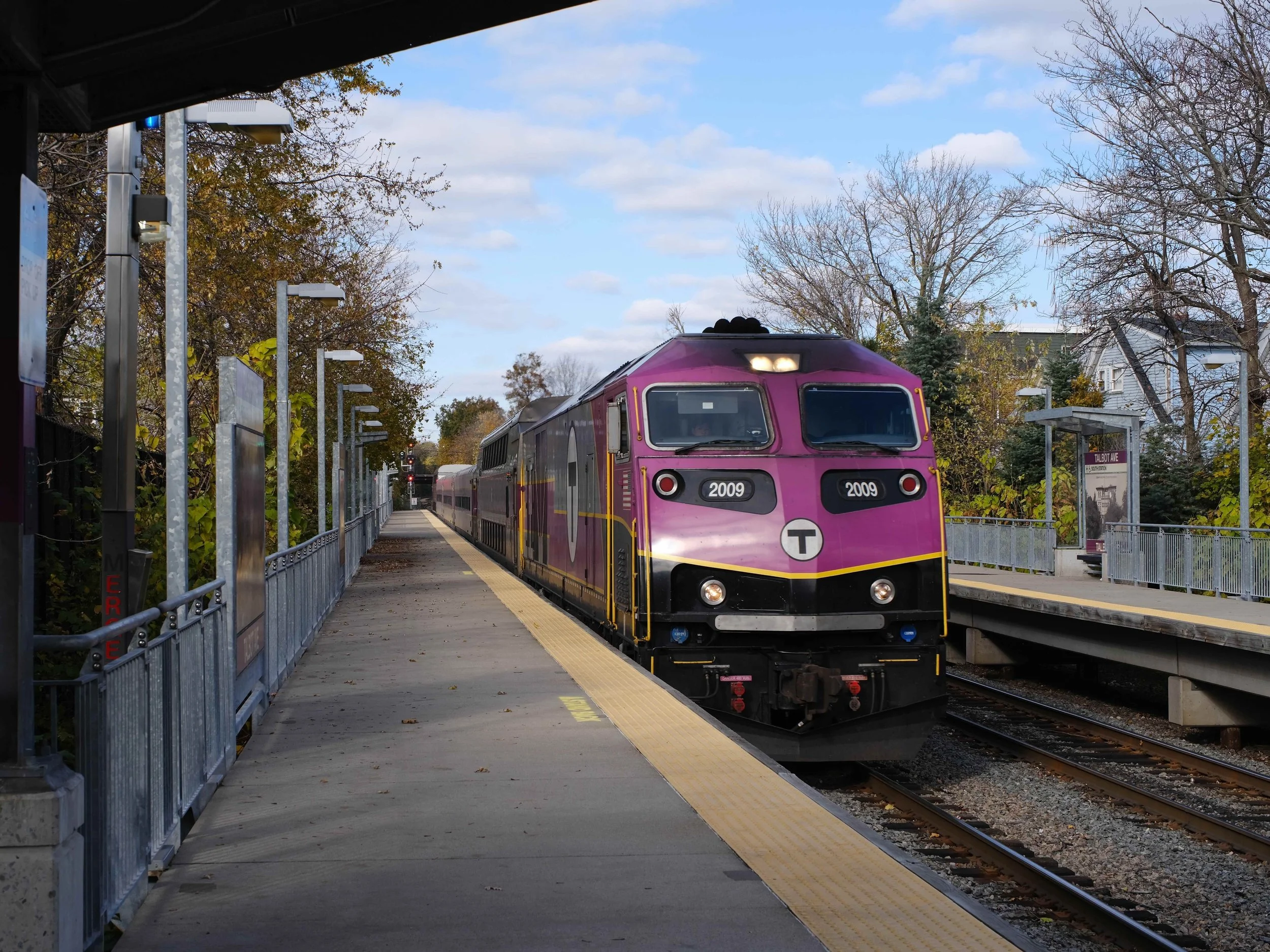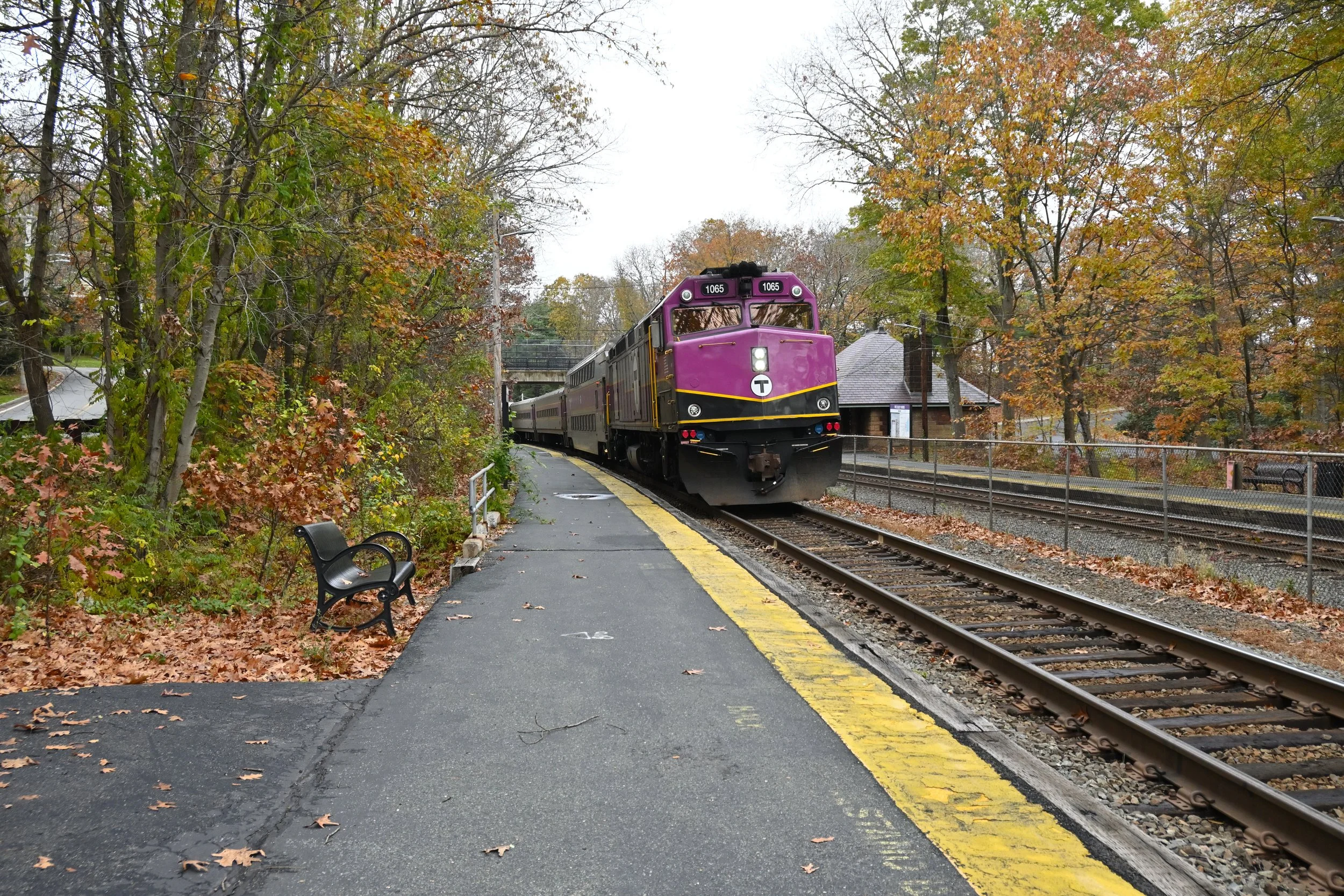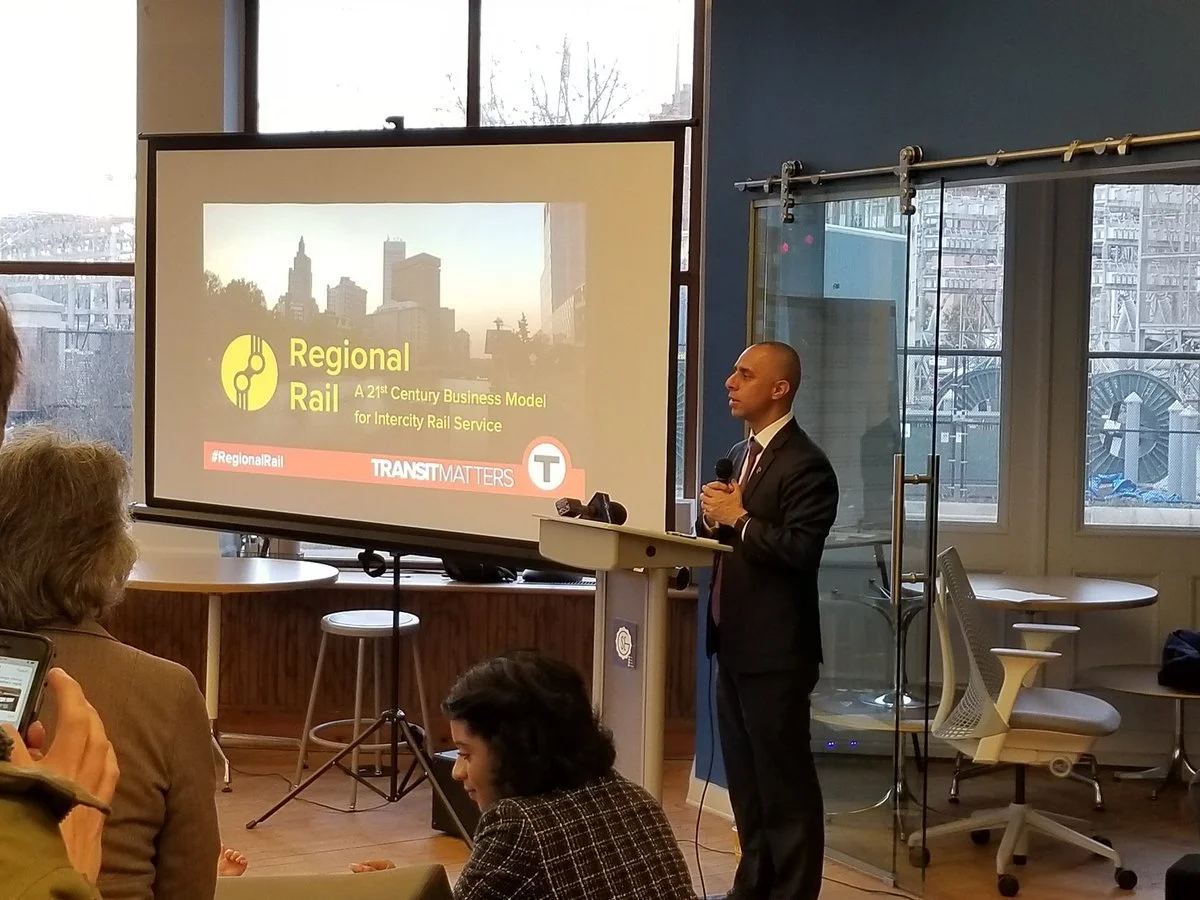
Media Statement: TransitMatters Celebrates the First Real Steps Towards Regional, Electrified Service on the Fairmount Line
"This monumental step represents the first real commitment to the Regional Rail vision laid out five years ago. [TransitMatters is] excited that the T is partnering with Keolis to test new technology that allows us to electrify the service faster and bring tangible benefits to riders.”
BOSTON, July 25, 2024 — TransitMatters is excited to celebrate the MBTA Board's approval of Commuter Rail operator Keolis’s plan to introduce battery-electric trains to the Fairmount Line by 2028. This landmark decision sets the stage for more frequent, fast, and reliable service, bringing us closer to a decarbonized and modernized regional rail network.
Today’s vote marks the first significant investment toward the Regional Rail vision. The Fairmount Line was one of three lines, along with the Newburyport/Rockport line to Beverly, that the MBTA’s then-board endorsed for Regional Rail service in 2019. As the fastest-growing Commuter Rail line, with over 100% of pre-COVID level ridership, the Fairmount Line is moving toward 20-minute service by 2028. This will provide subway-style frequencies and a high-quality transit option to communities that have long gone without the transit options they deserve.
"This monumental step represents the first real commitment to the Regional Rail vision laid out five years ago. We're excited that the T is partnering with Keolis to test new technology that allows us to electrify the service faster and bring tangible benefits to riders," said Jarred Johnson, Executive Director of TransitMatters.
"Keolis's innovation proposal will make a world of difference to communities along the Fairmount Line with fast, frequent, and reliable service. It's the first real step toward Regional Rail and a meaningful down payment on an entirely new Regional Rail system for the Commonwealth. We applaud Keolis and the MBTA for their vision here and look forward to seeing similar vision throughout the upcoming operator reprocurement process," stated Jackson Moore Otto, Regional Rail Lead.
Introducing battery-electric trains to the Fairmount Line is a significant milestone in the MBTA’s efforts to transform the Commuter Rail system. The new service is expected to reduce fuel consumption by 1.6 million gallons and cut carbon dioxide emissions by 17,700 tons annually compared to diesel trains. Fairmount Line riders will have modern trains that will allow for faster, smoother, quieter trips and more reliable service.
"This pilot delivers on the Regional Rail vision despite the T's funding challenges. We appreciate the hard work of the General Manager and his team, the folks at Keolis, and the Rail Transformation for making this happen," added Johnson.
This pilot project is a significant step forward for the Fairmount Line and a scalable model for electrification across the entire commuter rail network. It will allow the MBTA to move existing equipment to other lines and use spare BEMUs for further pilots.
"Regional Rail has the power to revolutionize how people get around Eastern and Central Massachusetts. This announcement, along with the addition of 30-minute service on the Fairmount Line and most hours on the Newburyport/Rockport trunk paired with real investments in 'no regrets' infrastructure across the network, are encouraging steps that show real progress on Regional Rail," said Tim Lawrence, Board President of TransitMatters.
We are grateful to our partners at the Fairmount Indigo Transit Coalition for their tireless advocacy. We applaud the T and Keolis for their vision in advancing this innovative and realistic proposal. Regional Rail is coming, and it can’t come soon enough.
For more information about the Regional Rail advocacy and the vision behind this transformative initiative, please visit TransitMatters Regional Rail Advocacy.
For media inquiries, please e-mail media@transitmatters.org.
###
2023 Regional Rail Retrospective
As Regional Rail gains momentum, we at TransitMatters are fine-tuning our advocacy strategy to keep pressure on the state and T to invest in the system.
BOSTON, January 30, 2024 — I’m excited to be writing the inaugural TransitMatters Regional Rail blog post! 2023 was the year Regional Rail went from idea to work-in-progress. I’m excited to start things by reviewing a promising year gone by and previewing what I believe will only be an even more fruitful year ahead.
2023 saw success in longstanding areas of advocacy for TransitMatters and a change in leadership that heralds more to come. I’m more hopeful than ever for the future and believe our advocacy is poised for its most significant year of impact so far.
What did we accomplish in 2023?
Key Regional Rail priorities saw an infusion of money under the Fiscal Year 2024-2028 Capital Investment Plan (CIP). The CIP is a short-term rolling document that sets out the T’s spending over the next four fiscal years. Looking through the CIP provides a rundown of what the T is working on. Unlike larger, more aspirational documents like Focus 40, if something is in the CIP, we know it’s going to happen. This year’s CIP brought $61 million of new money to Regional Rail efforts, including $2 million specifically for electrification planning on the Eastern Route between Boston and Beverly. Going forward, we’d like to see more ambition and specificity. Still, this year’s CIP marked improvement over previous cycles and set a new standard.
As the year ended, news broke of the T’s plans to electrify the Fairmount Line using battery-electric multiple units, with revenue service in late 2027. This is by far the most concrete move toward electrification of the system so far. If sustained, this would be a major win for the Fairmount Line and the whole system. We believe that this can happen on a parallel track with—and reinforce—further investment in catenary and electrification across the system. Right now, the benefits of electrification might be theoretical, or largely confined to decarbonization concerns. However, I firmly believe that once the riding public gets a taste of increased performance and comfort of electric trains, they won’t want to go back. Positive feedback is key to advancing and securing policy improvement, and we’re finally on track to see that for Regional Rail.
Commuter Rail set post-COVID ridership records and has emerged as a bright spot for the T. This success is noteworthy for a few reasons. First, the fastest-recovering line has been the Fairmount Line. It has seen the greatest investment in a Regional Rail type of service so far, with consistent—though still infrequent—service throughout the day and integration with the broader fare network. Other lines have seen a significant ridership increase as the MBTA and Keolis make service more frequent and consistent throughout the day. For example, the Franklin Line saw a ridership increase of more than 20% this fill. Ridership on the Commuter Rail network recovered to more than 90% of pre-COVID levels, outpacing the MBTA’s combined figures. One might expect the existing Commuter Rail—a service still in many ways optimized for 9-to-5, suburban-to-downtown commuters—to perform the worst post-COVID. The fact that it’s leading the pack drives home the importance of service quality as the determining factor for ridership, and makes clear that our Regional Rail improvements will only further increase ridership.
The Case for Optimism
I see strong foundations for future progress, even with the considerable challenges at the MBTA. The year began with major changes in leadership in the Commonwealth and at the MBTA that bode well for continued progress. Governor Maura Healey was inaugurated in January, and General Manager Phillip Eng joined the T in March. While it’s too early to judge either leader entirely, there are promising signs of a new-found recognition that investing in transit is essential to our Commonwealth’s economic vitality, climate goals, economic opportunity, and more.
The stakes are high, but the case for sober optimism is strong. Greater Boston looks poised to avoid the worst of the urban doom loop and to put the worst disruptions on the subway system behind us by the end of the year. The in-office presence that comes with lab space and the enduring strength of our universities have kept our core urban areas populated. Disruptions on the subway as part of the T’s Track Improvement Program will cause short-term gains. In the long term, it will improve service and ridership and eliminate arguments that the subway’s issues mean we can’t invest in Regional Rail.
As Regional Rail gains momentum, we at TransitMatters are fine-tuning our advocacy strategy to keep pressure on the state and T to invest in the system. We released our report on what the Framingham/Worcester Line needs to accomplish for Regional Rail on January 17, and we’re planning to release our report on the Franklin Line–our last line-by-line report–this spring. The release of our Franklin Line report will cap off a very productive 12 months that’s seen the release of reports on the Framingham/Worcester, Fitchburg, and Needham Lines and our Turning Vision into Reality report, which took a broader view of the investment case.
This blog post was written by Jackson Moore-Otto, TransitMatters’ Regional Rail Project Manager. For media inquiries, please email media@transitmatters.org or contact jmooreotto@transitmatters.org for your Regional Rail questions.
###
Photo Credit: James Wang
Celebrating 10 Years Of Advocacy: MBTA Board Endorses TransitMatters' Vision For Regional Rail
[The MBTA’s Fiscal and Management Control Board]’s resolutions largely followed the framework and phased approach that we laid out in our reports.
TransitMatters is celebrating 10 years of advocacy! To celebrate, we've been highlighting landmark moments in our history so far. Next up: Our advocacy and evidence-based research that pushed the MBTA to endorse TransitMatters’ vision for Regional Rail.
Members of TransitMatters introduce their plan to electrify the Commuter Rail system and add more frequency to lines (WBUR).
In 2018, the MBTA initiated their Rail Vision project to evaluate the future of the Commuter Rail. The Rail Vision team considered several possible alternatives, from optimizing the current system to a full transformation with 15-minute frequency. In February of the same year, we released Regional Rail for Metropolitan Boston during a live press event to stakeholders, policy makers, and the public. The report received rave reviews from policy makers, community leaders, and most importantly, riders, across the region.
In the spring of 2018, several municipalities openly supported a Regional Rail model, including the City of Newton, which advocated for a Regional Rail approach to rebuilding their three Commuter Rail stations. The Massachusetts Senate also included electrifying the Providence/Stoughton and Fairmount Lines in the state budget. Unfortunately, they ended up stripping it from the budget.
Providence Mayor Jorge Elorza at TransitMatters’ Regional Rail Whistle Stop Tour in 2019.
For the rest of the year, TransitMatters continued to influence dialog around modernizing the Commuter Rail as we worked on our follow up report. We visited communities across the region, presenting our Regional Rail vision, hosting happy hours, and speaking to any organization that wanted to know more about Regional Rail.
In September 2019, we released Regional Rail Proof of Concept! This report focused on how modest changes in both operations and track layout at South Station can have significant benefits to train capacity in the short-term. After releasing Proof of Concept, we worked with community, business, and elected leaders to write op-eds. We also organized a campaign to send hundreds of letters to the MBTA’s Rail Vision team in support of the boldest option for Regional Rail.
In November 2019, the MBTA’s Fiscal and Management Control Board (FMCB) endorsed Commuter Rail electrification to provide all-day, rapid-transit-style Regional Rail service throughout Greater Boston. Their resolutions largely followed the framework and phased approach that we laid out in our reports.
TransitMatters has not let up on our Regional Rail advocacy following the FMCB's endorsement. In 2020, we began releasing our line-by-line analyses, as well as our Regional Rail Phase I plan, and Turning Vision into Reality.
Due to our advocacy, Regional Rail has widespread name recognition! No one talked about Regional Rail or used the phrase in Massachusetts until we did. $61 million new money for Regional Rail has also been included in the in FY2024-2028 CIP, we are a key partner in advocacy coalitions along Phase I corridors, and our vision has been cited in significant articles.
Categories
- Children (1)
- Diversions (1)
- Olympics (1)
- MAPC (2)
- Red–Blue Connector (2)
- Urban Design (3)
- Bus (4)
- Fares (4)
- Late Night Service (4)
- MBTA ROC (4)
- Silver Line (4)
- Snow (5)
- Blue Line (8)
- Emergency (8)
- Orange Line (8)
- Public Comment (8)
- Maintenance (9)
- Operations (9)
- Signage (9)
- Fare Collection (10)
- Labs (11)
- Safety (11)
- Planning (12)
- Communication (14)
- MBCR (14)
- MassDOT (14)
- Green Line (16)
- History & Culture (16)
- Red Line (18)
- MBTA Bus (21)
- Commuter Rail (24)
- Advocacy (26)
- Capital Construction (28)
- Politics (30)
- Podcast (35)
- News (38)
- Media (40)
- Funding (42)
- Statements (50)
- MBTA (57)






